|
85 Church Street
Gillingham
https://whatpub.com/green-dragon
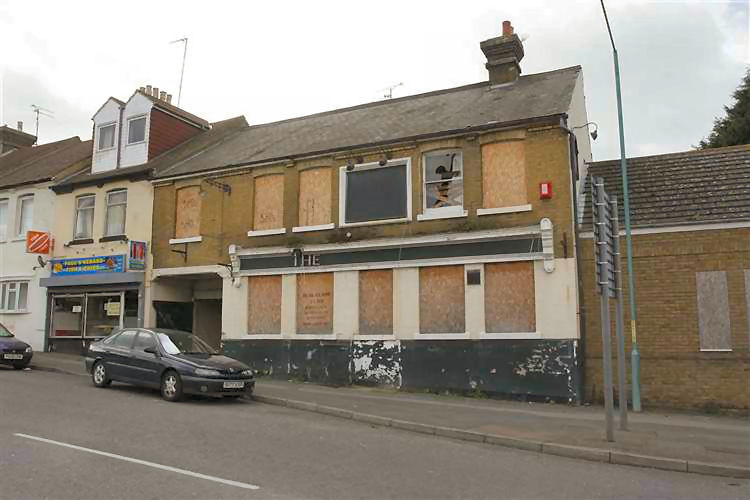
Above photo 2009. |
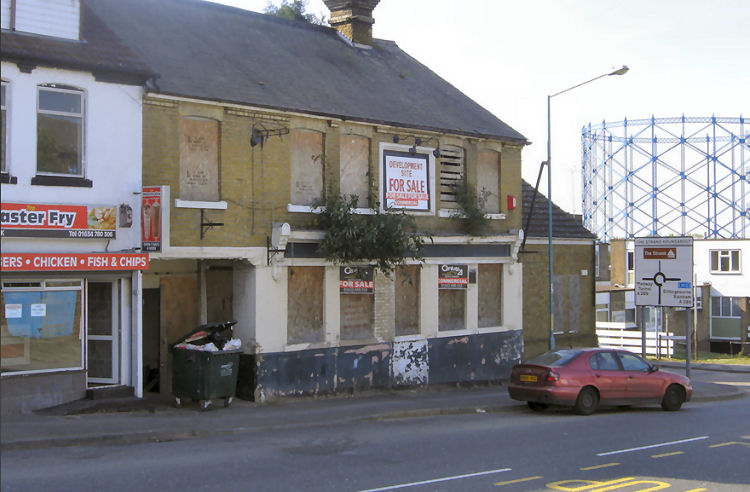
Above photo 2011, from www.Flickr.com by Ben Levick. |
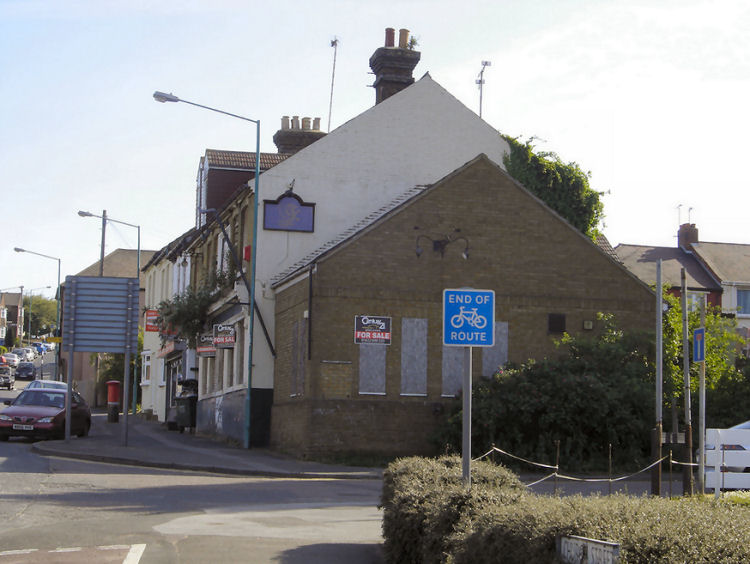
Above photo 2011, from www.Flickr.com by Ben Levick. |
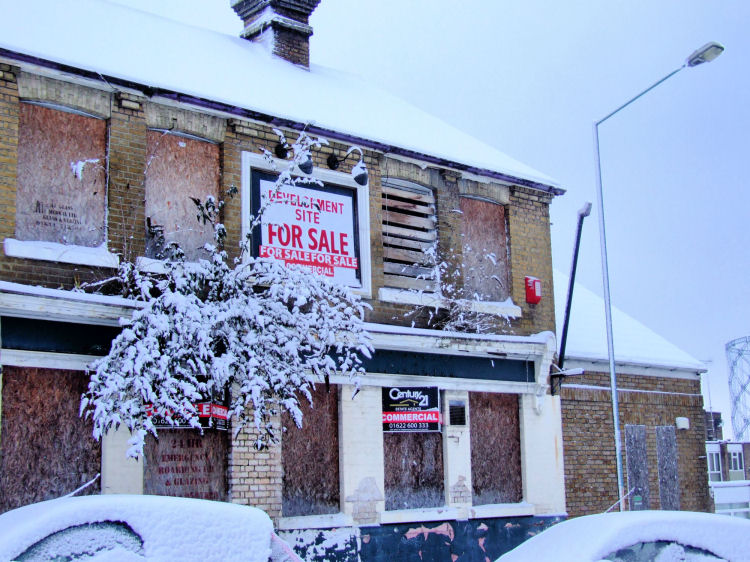
Above photo, February 2012, kindly sent by Arthur Cornwell. |
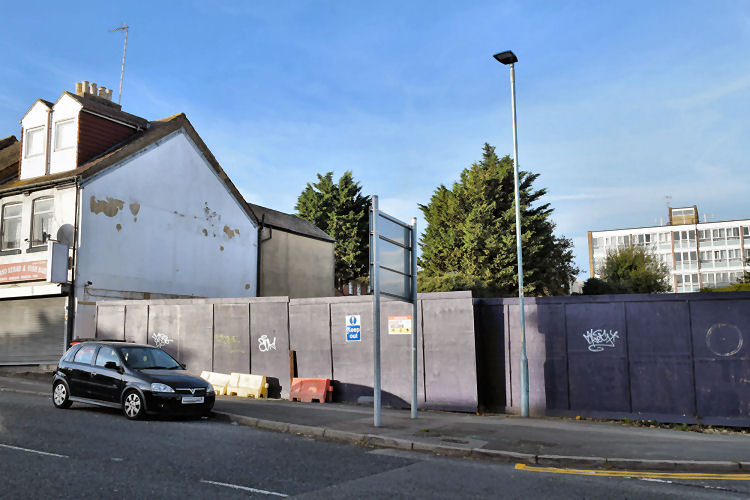
Above photo, November 2021, kindly sent by Arthur Cornwell. |
|
Information below by Ben Levick
Mary Boy was recorded as landlady as early as 1766 although the pub
may have been there for some time before that date. It was known to have
smuggling connections in the 18th century. In the early 20th century a
whale was washed up on the Gillingham shore nearby, and for many years
the bones were exhibited in the pub!
I believe it closed in the early 2000s.
|
Addressed as number 12 in the 1881 census.
|
Kentish Gazette - Saturday 29 June 1776.
To BE SOLD BY AUCTION.
On THURSDAY, the 4th Day of July, 1776, at the "Golden Lion," in Brompton,
near Chatham, between the Hours of Four and Five o'Clock in the
Afternoon precisely.
ALL those four Freehold Messuages or Tenements, with the several Yards
and Gardens thereto belonging, with their Appurtenances, the one of them
the "Green Dragon," and the others close adjoining; situate in Gillingham
in the County of Kent; and now in the several Occupations William Newnham, John Simson, James Basset, and Bennet Davis, under several
reserved Rents, amounting to 16l. 5s. a Year.
For further Particulars enquire of Mr. DIXON, or Mr. HICK, in Rochester.
|
|
From the South Eastern Gazette, 6 December 1853.
DREADFUL EXPLOSION—TWO LIVES LOST.
On Friday night last, at about half-past nine o'clock, a violent
explosion took place at the Gillingham gas works near St. Mary's
barracks, Brompton, by which the lives of two men, named John Rensby
Culyer and William Hall, have been sacrificed.
It appears that the Messrs. Rickon have been engaged for several
months past in erecting extensive gas works near the river Medway, at
Gillingham. The works had been proceeded with all possible despatch, and
at the time of the explosion were in so forward a state that a supply of
gas would have been ready by the next night. During the whole of Friday
evening the workmen were engaged, under the immediate superintendence of
Mr. Rickon, in charging the gasometer, a large quantity of gas having
been admitted. A loud noise attracting the attention of the men, it was
at once suspected that there was something wrong, and Culyer, the
engineer, accompanied by Hall, ascended to the top of the gasometer to
discover what was amiss, foolishly taking a light with them. Mr. Rickson
advised Culyer not to go that evening, but he appeared not to have
attended to the directions given. On the two men reaching the top the
escape of gas must have come in contact with the flame, for immediately
after a loud explosion took place, bursting the top of the gasometer,
which was lifted some height, and tearing of three of the new pillars or
“guide lines."
The body of Culyer was found in the tank of the gasometer,
frightfully disfigured, and quite dead. The body of Hall had not been
discovered on Sunday evening, but it was supposed to be lying beneath
the gasometer. At the time of the explosion there were several persons
in and about the premises, none of whom were hurt. It is a rather
singular circumstance that one of the persons who has met with his death
was the individual who got Mrs. Henniker out of the ruins at the recent
fatal explosion of fireworks, at Chatham, and carried her across the
street to the "Chest
Arms."
Owing to this untoward accident it will be some time before the works
are in a fit state to supply the parish of Gillingham with gas.
THE INQUEST
The inquest was held yesterday (Monday) morning, at the "Green
Dragon" on the bodies of the unfortunate men. John Ormsby Culyer and
John Richard Hall, who were killed by the explosion.
Mr. Shindler, solicitor, attended to watch the proceedings for the
Messrs. Rickon.
The Coroner and jury having viewed the bodies which lay at the the
gas-house, the following evidence was taken.
Mr. Weeks, surgeon, at Brompton, deposed that he was called on Friday
night to the gas-works. The body of Culver was then lying near the
retort-house and quite dead. The body had been taken out of the
gasometer tank, having been thrown in by the force of the explosion
Witness made an external examination, and discovered a severe bruise on
the right side of the head. The cause of death was from drowning, the
blow on the head having no doubt stunned him.
John James Rickson, the manager at the works, deposed that they had
been forcing gas into the holder all day on Friday, having commenced at
4 o’clock. About 9 o’clock in the evening, witness was sitting in the
retort-house, telling a workman what to do, when the deceased (Culyer)
came in; witness had not seen him since Monday afternoon. The deceased
was in very high spirits. Witness at this time was congratulating the
workman that the third charge just driven in would forca the crown of
the holder out. Two charges, each of 49lbs. of coal, had been driven in,
the mixture causing what was known as "choke damp." Deceased called for
a candle, went out with Hall, and ascending to the top of the holder, on
his return said that everything was going on right. As far as witness
could judge Culyer was perfectly sober. When deceased arrived at the top
of the holder, Hall turned the tap of the standpipe, to which he applied
a light, when there appeared a beautiful blue flame about the size of a
pea. When Colyer went to the top witness felt a peculiar sense of dread
come over him. Deceased put out the flame and returned to the
retort-house. On finding that the burner in the retort-house would not
burn, they proceeded to the top of the holder a second, and subsequently
a third time, on each occasion taking the lighted candle with them,
trying the same experiment. On the third occasion witness saw Culver
apply the light as before, and for a few seconds no flame appeared from
the pipe, but witness saw the light of the candle as if drawn into the
pipe. The gas holder then rose bodily, and when it was not able to
resist the force, the explosion took place. The holder was rent asunder,
and the men went down into it. Culyer’s body was taken out, quite dead,
a few minutes afterwards, but Hall's was not discovered till Sunday
night.
Henry Beaumont, one of the workmen in the retort-house, hearing the
explosion, ran out. Heard Culyer struggle in the water and groan two or
three times, when taken out he was quite dead.
Mr. Pope was also examined, who proved assisting to get Culyer’s body
out of the water.
The jury, after a few remarks from the coroner, returned a verdict,
“That the deceased John Ormsby Culyer was killed by an explosion at the
gas works, but whether drowned or suffocated by gas there was not
sufficient evidence to show.
|
|
Windsor and Eton Express, Saturday 10 December 1853.
Fatal explosion at Chatham.
On Friday night, about 9:30 o'clock, the inhabitants of Chatham were
thrown into a state of excitement in consequence of a rumour that a
dreadful explosion had occurred at the new gas works recently erected
nearly St. Mary's Barracks for supplying the out-parish of Gillingham
with gas, and by which two lives have been sacrificed.
It appears that two brothers, the Messrs. Rickon, have erected, at their
own expense, extensive works near the River Medway, for the manufacture
of gas on a large scale. The gasometer had been erected, and everything
was so far completed that it was determined to fill the gasometer,
preparatory to lighting up the parish on the following (Saturday) night.
A large quantity of gas had been admitted into the gasometer. Mr. Rickon
himself superintending the operation, when it was found that the gas was
escaping from some part of it, and the engineer (John Ormsby Collier),
and also a workman named William Hall, proceeded to the top of it to see
from what part of it the leakage came, incautiously taking with them a
lighted candle. Mr. Rickon requested Culyer not to venture, but he
appears to have disobeyed the order, for, immediately after reaching the
top of the gasometer, the gas, coming in contact with a flame of the
candle, blew up with a loud report. Culyer, the engineer, was blown a
great distance into the adjacent marshes, and, when discovered, was
frightfully mangled, and, of course, quite dead. The force of the
explosion was so great as to blow out the top of the gasometer and break
three of the guide lines. The other parts of the premises have received
little or no damage.
An inquest was held on the bodies of Culyer and Hall on Monday, at the
"Green Dragon," Gillingham. The jury, having been sworn, proceeded to
view the bodies, which lay in the retort-house at the gasworks. The
effects of the explosion had been most complete. The large gasometer
appeared as if broken in half, the iron-work having collapsed. The
brickwork of the tank in which the gasometer floated was destroyed in
several places, and three of the "guide-lines" broken off. About 9 feet
of water were in the tank at the time of the accident.
After a patient enquiry, the jury returned a verdict:- "That the
deceased were accidentally killed by an explosion at the gasworks; but
whether drowned or suffocated by the gas there was not sufficient
evidence to show."
|
The pub was auctioned for the sum of £250,000 in June 2012 for housing.
|
From the
https://www.kentonline.co.uk By Jenni Horn, 19 July 2022.
Works starts on site of The Green Dragon pub in Gillingham.
Work has begun on the site of a former pub which closed down more
than 10 years ago.
The Green Dragon in Gillingham dated back to 1776 and had a
colourful history before it shut in 2008.
It was known to have smuggling connections in the 18th century and
inquests were held there in the 1800s, including the inquest into
the deaths of two men who were killed in an explosion at Gillingham
gas works in 1853.
In the early 20th century a whale was washed up on the shore nearby
and for many years the bones were on display in the pub in Church
Street.
The pub sold at auction in for £250,000 in June 2012.
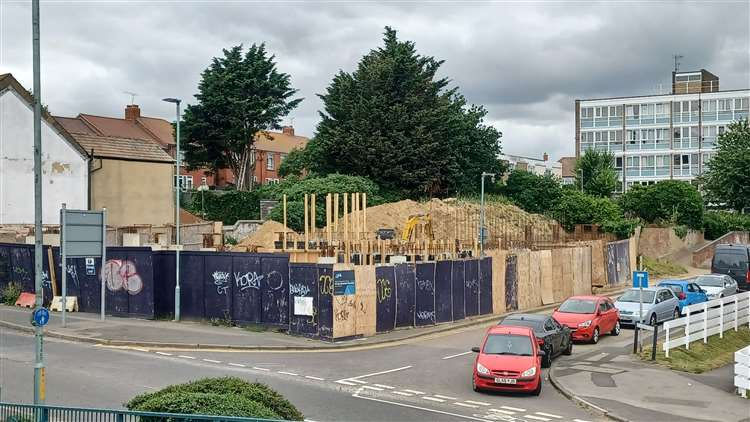
Work has started on the site of the Green Dragon pub in Church
Street.
The site has a long planning history with permission first granted
in 2007 to demolish the pub and replace it with 16 flats.
Another application was approved in 2013 for 14 flats. This was
followed by two more applications in 2014 and 2015 but these were
withdrawn. Permission was granted for 17 flats in 2018.
The latest application to be approved was in 2019, for 16 flats
arranged over the ground, first, second and third floors with ground
floor parking. The blueprints include 22 residents' parking spaces
and four visitor spaces. |
Local knowledge, further pictures, and licensee information would be
appreciated.
I will be adding the historical information when I find or are sent it,
but this project is a very big one, and I do not know when or where the
information will come from.
All emails are answered.
LICENSEE LIST
NEWNHAM William 1776-90 dec'd
NEWNHAM Elizabeth (widow) 1790-1812+
ORGAN William Thomas 1828+

LUFF Mary 1832+

VENNER William 1858-61+ (age 21 in 1861 ) )
SWADDEN Thomas 1862-67+
BAKER William 1871+ (age 51 in 1871 ) )
BAKER William 1881+ (son) (age 41 in 1881 ) )
BAKER James E (son) 1891-1901+ (age 32 in 1891 ) )
GREEN Nathaniel 1903+

LOVE Walter Edward 1911+ (age 23 in 1911 ) )
MORRIS Charles G 1913-22+
BARNARD George 1930+
MURR Robert James Thomas 1938+ (age 38 in 1939)
GEERING Herbert Henry Leonard 1955+
https://pubwiki.co.uk/GreenDragon.shtml
http://www.closedpubs.co.uk/greendragon.html
 From the Pigot's Directory 1828-29 From the Pigot's Directory 1828-29
 From the Pigot's Directory 1832-33-34 From the Pigot's Directory 1832-33-34
 From the Kelly's Directory 1903 From the Kelly's Directory 1903
 Census Census
|





